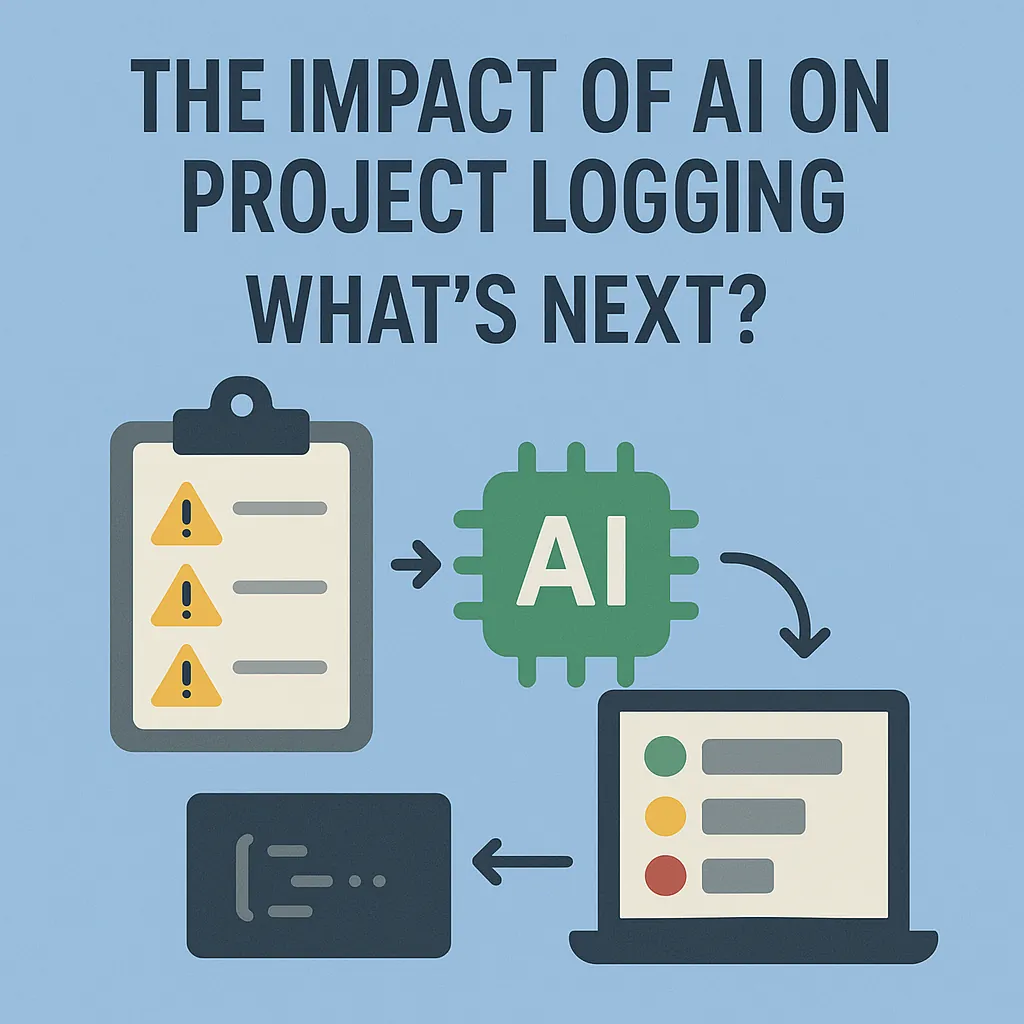Introduction to Project Logging
Project logging serves as a critical tool for ensuring that all aspects of a project are documented and tracked effectively. A project log is essentially a comprehensive record that captures various elements of a project, including action items, change requests, assumptions, issues, and risks. This log is vital for project teams as it consolidates essential information, allowing for better decision-making and enhanced communication among stakeholders [1].
Importance of Maintaining Accurate Project Logs
Maintaining accurate project logs is crucial for several reasons:
- Tracking Progress: A well-maintained project log provides a clear timeline of events, helping project managers and teams monitor progress against established goals and deadlines. This visibility is essential for identifying any deviations from the plan and addressing them promptly [2].
- Facilitating Communication: Project logs serve as a central point of reference for all team members and stakeholders. By documenting discussions, decisions, and changes, project logs enhance transparency and ensure that everyone is on the same page, reducing the likelihood of misunderstandings [2].
- Accountability: Accurate logging fosters accountability within the project team. By clearly documenting who is responsible for specific tasks and decisions, project logs help ensure that team members are held accountable for their contributions, which can lead to improved performance and outcomes [2].
Overview of Traditional Project Logging Methods and Their Limitations
Traditionally, project logging has relied on manual methods, such as spreadsheets or paper-based logs. While these methods have served their purpose, they come with several limitations:
- Time-Consuming: Manual logging can be labor-intensive, requiring significant time and effort to maintain. This can detract from the time project managers and teams could spend on more strategic activities [3].
- Prone to Errors: Human error is a common issue with traditional logging methods. Inaccuracies in data entry can lead to miscommunication and misinformed decision-making, ultimately impacting project success [3].
- Limited Accessibility: Traditional logs may not be easily accessible to all team members, especially in remote or hybrid work environments. This can hinder collaboration and slow down the decision-making process [3].
As we explore the advancements in artificial intelligence (AI) within project management, it is essential to consider how these technologies can address the limitations of traditional project logging methods. AI has the potential to automate routine logging tasks, enhance data accuracy, and improve accessibility, thereby transforming the way project logs are maintained and utilized in the future.
The Role of AI in Project Management
As project management continues to evolve, the integration of artificial intelligence (AI) technologies is becoming increasingly significant. This section explores the advancements in AI that are reshaping project logging and management practices, providing tech-savvy project managers with insights into the future of their field.
Explanation of AI Technologies Relevant to Project Management
AI encompasses a variety of technologies that can enhance project management processes. Key technologies include:
- Machine Learning (ML): This subset of AI enables systems to learn from data and improve their performance over time without explicit programming. In project management, ML can analyze historical project data to predict outcomes and optimize resource allocation.
- Natural Language Processing (NLP): NLP allows machines to understand and interpret human language. This technology can be utilized in project logging to automate the documentation process, making it easier to capture meeting notes, action items, and project updates in real-time.
- Automation Tools: AI-driven automation can streamline repetitive tasks such as scheduling, budgeting, and risk assessment, freeing project managers to focus on strategic decision-making rather than mundane administrative duties.
Current Trends in AI Adoption within the Project Management Sector
The project management sector is witnessing a surge in AI adoption, driven by the need for greater efficiency and effectiveness. Some notable trends include:
- Increased Use of AI Tools: Many organizations are implementing AI-enabled project management tools that enhance decision-making processes. These tools provide real-time insights and analytics, allowing project managers to make informed choices quickly [9][14].
- Focus on Data-Driven Decision Making: As project managers increasingly rely on data analytics, AI technologies are being integrated to provide predictive insights. This shift towards data-driven decision-making is helping teams mitigate risks and improve project outcomes [10][11].
- Integration of AI in Quality Control: AI is also being utilized to enhance quality control workflows, improving accuracy and efficiency in project execution. This integration ensures that projects meet their objectives while adhering to quality standards [12].
Benefits of AI in Enhancing Productivity and Decision-Making in Project Management
The incorporation of AI into project management practices offers numerous benefits that can significantly enhance productivity and decision-making:
- Automation of Routine Tasks: By automating repetitive tasks, AI allows project managers to allocate their time and resources more effectively, leading to increased productivity [10][13].
- Improved Risk Mitigation: AI tools can analyze vast amounts of data to identify potential risks early in the project lifecycle, providing project managers with more options for risk mitigation [9].
- Enhanced Decision-Making: AI-powered tools support project managers by providing accurate data and insights, which can lead to better-informed decisions and ultimately more successful project outcomes [14][15].
AI Advancements in Project Logging
The integration of artificial intelligence (AI) into project management is revolutionizing various aspects, including project logging. As project managers increasingly adopt advanced technologies, the following key advancements in AI are transforming how project logs are maintained and utilized:
- Automated Data Entry and Real-Time Logging Capabilities: AI technologies are streamlining the data entry process by automating routine tasks. This automation not only reduces the time spent on administrative duties but also enhances the accuracy of the information recorded in project logs. With real-time logging capabilities, project managers can capture updates and changes as they occur, ensuring that the project log reflects the most current status of the project. This immediacy allows for better tracking of progress and more informed decision-making throughout the project lifecycle [2][5].
- Predictive Analytics for Foreseeing Project Challenges: AI’s ability to analyze vast amounts of data enables project managers to leverage predictive analytics effectively. By identifying patterns and trends from historical project data, AI can forecast potential challenges before they escalate. This proactive approach allows project managers to implement contingency plans and mitigate risks early on, ultimately leading to improved project outcomes. The use of predictive analytics in project logging enhances the ability to anticipate issues related to timelines, resource allocation, and budget constraints [10][11].
- Integration of AI Chatbots and Virtual Assistants: The incorporation of AI chatbots and virtual assistants into project management tools is enhancing the way project logs are updated and queried. These intelligent systems can facilitate log updates by allowing team members to interact through natural language, making it easier to input data or retrieve information. This integration not only saves time but also encourages team collaboration by providing instant access to project logs and updates. As a result, project managers can maintain a more comprehensive and accessible log, fostering better communication and transparency within the team [2][8].
Case Studies: Successful AI Implementation in Project Logging
The integration of Artificial Intelligence (AI) into project management, particularly in project logging, has shown significant promise in enhancing efficiency and accuracy. Below are some real-world examples of organizations that have successfully leveraged AI for project logging, along with the quantifiable outcomes and lessons learned from these implementations.
Overview of Companies Successfully Integrating AI
- Healthcare Sector: A notable case is the implementation of an Electronic Health Record (EHR) system that utilized AI to streamline project logging. This system not only improved patient care but also enhanced operational efficiency by automating the logging of patient interactions and treatment plans, allowing healthcare professionals to focus more on patient care rather than administrative tasks [12].
- Manufacturing Industry: Companies in manufacturing have adopted AI-driven project logging tools that monitor equipment performance and project timelines. These tools analyze data in real-time, providing insights that help project managers make informed decisions quickly. This integration has led to improved equipment uptime and increased throughput, demonstrating the effectiveness of AI in managing complex projects [3].
- Software Development: In software development, AI has been utilized to manage project logs by automating the documentation of project milestones and team communications. This has resulted in a more organized project management process, reducing the time spent on manual logging and increasing overall productivity [10].
Quantifiable Outcomes and Improvements
- Time Savings: Organizations that have implemented AI in their project logging processes report significant time savings. For instance, the automation of logging tasks has reduced the time project managers spend on documentation by up to 30%, allowing them to allocate more time to strategic planning and execution [13].
- Error Reduction: AI systems have demonstrated a marked decrease in logging errors. By utilizing machine learning algorithms to analyze data patterns, these systems can flag inconsistencies and suggest corrections, leading to a reduction in errors by approximately 25% [15].
- Enhanced Decision-Making: The real-time data analysis capabilities of AI tools have empowered project managers to make quicker and more informed decisions. This has been particularly beneficial in fast-paced environments where timely responses are critical to project success [11].
Lessons Learned and Best Practices
- Structured Implementation: Successful AI integration requires a structured approach. Organizations that have thrived in this transition emphasize the importance of identifying specific business challenges that AI can address, ensuring that the technology aligns with project goals [6].
- Continuous Training: Providing ongoing training for project managers and team members on how to effectively use AI tools is crucial. This not only enhances user adoption but also maximizes the benefits derived from AI technologies [2].
- Feedback Loops: Establishing feedback mechanisms to assess the effectiveness of AI tools in project logging is essential. Organizations that regularly review and refine their AI applications based on user feedback have seen better outcomes and higher satisfaction rates among project teams [4].
- Collaboration with AI Experts: Engaging with AI specialists during the implementation phase can help organizations tailor solutions to their specific needs, ensuring that the AI tools are effectively integrated into existing workflows [1].
Challenges and Considerations for AI in Project Logging
As project management increasingly integrates artificial intelligence (AI) technologies, project logging is undergoing a significant transformation. However, this shift is not without its challenges and considerations that tech-savvy project managers must navigate. Here are some key points to consider:
- Data Privacy and Security Concerns: The implementation of AI tools in project logging necessitates access to vast amounts of data, which raises significant concerns regarding data privacy and security. Project managers must ensure that the AI systems they adopt are designed to protect sensitive information and comply with relevant regulations. This includes implementing robust data security measures to prevent unauthorized access and ensuring that data handling practices respect individual privacy rights [7][12].
- Potential for Over-Reliance on AI: While AI can enhance efficiency and accuracy in project logging, there is a risk of over-reliance on these technologies. Project managers should recognize that AI-generated insights are not infallible and should complement, rather than replace, human judgment. Maintaining a balance between AI capabilities and human oversight is crucial to ensure that project decisions are well-informed and consider the nuances that AI may overlook [1][3].
- Cost Implications and Resource Allocation: The adoption of AI solutions in project logging can entail significant costs, including software acquisition, training, and ongoing maintenance. Project managers must carefully evaluate the financial implications and allocate resources effectively to ensure a successful implementation. This includes considering the long-term benefits of AI against the initial investment and ensuring that the project team is adequately trained to leverage these new tools [6][11].
Future Trends in AI and Project Logging
As project management continues to evolve, the integration of artificial intelligence (AI) is set to revolutionize various aspects, including project logging. This section explores the anticipated advancements in AI and their implications for project logging, particularly for tech-savvy project managers.
Predictions on the Next Wave of AI Innovations in Project Management
The future of project management is increasingly intertwined with AI technologies. By 2030, it is predicted that 80% of project managers’ tasks will be automated through AI, leveraging big data, machine learning (ML), and natural language processing (NLP) to enhance decision-making and streamline processes [4][9]. This shift will likely lead to more sophisticated project logging systems that can automatically capture and analyze project data in real-time, providing project managers with actionable insights and reducing the administrative burden associated with manual logging.
The Potential Shift Towards Fully Automated Project Management Systems
The concept of fully automated project management systems is on the horizon, where AI could oversee and execute entire projects with minimal human intervention. Such systems would not only log project activities but also analyze performance metrics, predict potential risks, and suggest corrective actions [12]. This level of automation could transform project logging from a reactive process into a proactive one, allowing project managers to focus on strategic decision-making rather than routine data entry.
Emerging Technologies Complementing AI in Project Logging
In addition to AI, several emerging technologies are poised to enhance project logging capabilities:
- Blockchain: This technology can provide a secure and transparent way to log project activities, ensuring data integrity and traceability. By utilizing blockchain, project managers can create immutable records of project milestones, changes, and communications, which can be invaluable for audits and compliance [10].
- Internet of Things (IoT): IoT devices can facilitate real-time data collection from various project sites, feeding information directly into project logging systems. This integration can enhance the accuracy of logs by capturing data from sensors and devices, such as equipment usage and environmental conditions, thereby providing a comprehensive view of project progress [10].
- Predictive Analytics: Leveraging AI-driven predictive analytics can help project managers anticipate future project challenges based on historical data. This capability can enhance project logging by not only documenting what has happened but also forecasting potential issues and enabling proactive management strategies [8].
Conclusion
In the rapidly evolving landscape of project management, the integration of artificial intelligence (AI) into project logging practices is proving to be transformative. AI advancements have significantly enhanced the efficiency and accuracy of project logs, allowing project managers to streamline processes and make informed decisions. Here are the key takeaways regarding the impact of AI on project logging:
- Enhanced Efficiency: AI tools automate routine logging tasks, reducing the time project managers spend on administrative duties. This allows them to focus more on strategic planning and execution, ultimately driving project success [10][11].
- Improved Data Analysis: With AI, project managers can analyze vast amounts of data quickly and accurately. This capability helps in identifying risks and issues early, enabling proactive management and timely interventions [12][14].
- Streamlined Communication: AI facilitates better communication within project teams by providing real-time updates and insights. This ensures that all stakeholders are aligned and informed, which is crucial for maintaining project momentum [11][13].
As we look to the future, it is essential for project managers to embrace these technological advancements. By exploring AI tools and staying updated on the latest innovations, project managers can enhance their logging practices and overall project management effectiveness.
Find out more about Shaun Stoltz https://www.shaunstoltz.com/about/.
This post was written by an AI and reviewed/edited by a human.



